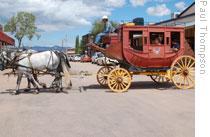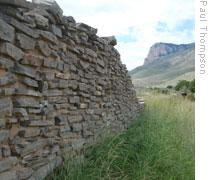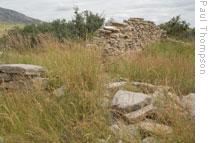-
(单词翻译:双击或拖选)
Welcome to THIS IS AMERICA in VOA Special English. I'm Bob Doughty1.
VOICE TWO:
 |
| A stagecoach2 like ones used by the Butterfield company |
And I'm Barbara Klein. Last week on our program, we described the underground world of Carlsbad Caverns3 National Park. Carlsbad is in the southwestern state of New Mexico. Today we cross the state line into Texas to tell you about another national park -- but this time we stay above ground. We tell about its place in the history of the first stagecoaches4 that carried mail to the American West.
(MUSIC)
VOICE ONE:
Across the United States, the speed limit on fast roads is generally eighty-eight kilometers an hour. But in the western United States, there are highways where the speed limit is one hundred twenty-five kilometers an hour.
These are usually in areas with little traffic but lots of open country. The roads are good, a driver can see far -- and a trip hundreds of kilometers long can take just a few hours. And if that is not fast enough, then people can drive to another part of the modern transportation system: the airport.
There used to be a time when the quickest way to travel across the western United States was in a stagecoach. A stagecoach was a large, enclosed wagon5 pulled by teams of horses or mules7. The driver tried for a speed of about eight kilometers an hour.
VOICE TWO:
Our story really begins in Washington, D.C. Lawmakers in Congress wanted to make it possible to send mail all the way across the United States by land. Mail was usually carried west on ships that sailed around the bottom of South America and then north to California. That could take several months.
 |
| John Butterfield |
So, in eighteen fifty-seven, Congress offered to help any company that would try to deliver mail overland to the West Coast. A man named John Butterfield accepted this offer. He developed plans for a company that would carry the mail -- and passengers, too.
Congress gave John Butterfield six hundred thousand dollars to start his company. In return, he had to promise that the mail would travel from Saint Louis, Missouri, to San Francisco, California, in twenty-five days or less.
VOICE ONE:
It was not possible to travel straight through because of the Rocky Mountains and the deep snow that fell in winter. So the stagecoach would travel south from Saint Louis to El Paso, Texas, then over to southern California, then north to San Francisco. The distance was about four thousand five hundred kilometers.
John Butterfield hired more than one thousand men who knew the Southwest. Some carefully planned the way the stagecoach would travel. Others built small structures to house stagecoach workers and animals along the route.
VOICE TWO:
Two hundred of these stations were built, each about thirty-two kilometers apart. The workers were to quickly change the horses or mules whenever a stagecoach reached the station. There could be no delay.
Each stagecoach was to travel nearly two hundred kilometers a day. Two-man teams were responsible for the safety of the mail, the passengers and the stagecoach. John Butterfield ordered his men never to let the mail out of their sight.
The Butterfield Overland Mail company operated from eighteen fifty-eight until eighteen sixty-one. It went out of business because of the Civil War, which began that year.
VOICE ONE:
One hundred stagecoaches were built specially8 for the job. Each one was painted red or dark green. These were the most modern coaches that money could buy. They cost one thousand five hundred dollars each.
They were designed to hold as many as nine passengers and twelve thousand pieces of mail. The seats inside could be folded down to make beds. Passengers either slept on them or on the bags of mail.
The cost would be one hundred fifty dollars to travel from Saint Louis to San Francisco. If a passenger was not going all the way, the cost was about ten cents a kilometer. The passengers had to buy their own food at the stations. The stagecoach would stop for forty minutes, two times a day.
But the Butterfield Overland Mail stagecoach needed to travel as fast as possible. It had to keep moving to reach San Francisco in twenty-five days as required by the government contract.
The company warned passengers about the possible dangers. A poster said: "You will be traveling through Indian country and the safety of your person cannot by vouchsafed9 by anyone but God."
VOICE TWO:
The Butterfield stagecoaches passed through dangerous areas. Some Indians did not want anyone to get too near their settlements.
These lands were home to the Chiricahua, Membreno, White Mountain and Mescalero Apaches. Two of their chiefs became very famous in stories of the American West. They were Cochise and Geronimo.
The Native Americans were experts at surviving in the mountains and deserts of the Southwest. They were also fierce fighters.
Butterfield workers were instructed not to incite10 the Apaches in any way. Often the company would use mules instead of horses to pull its stagecoaches because the Indians had no interest in mules. But there was still trouble. Workers were killed, animals were stolen and stations were burned.
(MUSIC)
VOICE ONE:
The first Butterfield Overland Mail stagecoach left Missouri on September sixteenth, eighteen fifty-eight, on its way to California. It made the trip in twenty-three days, twenty-three hours.
The only passenger on that first stage to travel all the way through to San Francisco was a newspaper reporter named Waterman Ormsby. He worked for the New York Herald11. He wrote several stories about the trip; later, they were put together in a book, "The Butterfield Overland Mail." Here is part of what he wrote about that trip.
READER: "We finally got under way again and pursued our weary course along the edge of the plain, thumping12 and bumping at a rate which threatened not to leave a whole bone in my body. What with the dust and the sun pouring directly on our heads … I found that day's ride quite unpleasant, and at our several camps readily availed myself of the opportunity to plunge13 into the Pecos, muddy as it was; and I was heartily14 glad when about 10 p.m. we reached a station fifty-eight miles from our starting point in the morning ... "
(MUSIC)
VOICE TWO:
 |
| The ruins of a stagecoach stop near Guadalupe Peak |
Today people can visit the ruins of one of the Butterfield stagecoach stops, now located in Guadalupe Mountains National Park. To reach the park, visitors drive through the Guadalupe Pass, more than one thousand five hundred meters high.
In his description of that first trip west, Waterman Ormsby explained why the station was called "the Pinery."
READER: " ... on account of the number of pine trees that grow in the gorge15 of the mountain in which it is situated16. As we approached the mountain, the hills and gulleys bore the appearance of having been created by some vast, fierce torrent17 rushing around the base of the peak, and tearing its way through the loose earth. ... [I]t seems as if nature had saved all her ruggedness18 to pile it up in this colossal19 form of the Guadalupe Peak …
The great peak towers as if ready at any moment to fall, while huge boulders20 hang as if ready, with the weight of a rain drop, to be loosened from their fastenings and descend21 with lumbering22 swiftness to the bottom, carrying destruction in their paths."
VOICE TWO:
The Pinery Station was a series of three connected buildings. The walls were made of local limestone23 and bricks of sun-dried mud called adobe24. The roofs were also mud. A wagon repair shop and blacksmith barn stood nearby.
The Butterfield mail coaches used the buildings until August of eighteen fifty-nine. Then a new road replaced the one through Guadalupe Pass. It was better protected from Indian attacks because it passed by two Army forts. But the buildings at Guadalupe continued to be used by soldiers and others who passed that way.
VOICE ONE: Today, the buildings are no longer there, just the outlines of where they stood, and some of the original bricks. But visitors to Guadalupe Mountains National Park in West Texas can still get a sense of their historic importance. The company is said to have never broken its contract with the government in its two and a half years of operation.
Today, the buildings are no longer there, just the outlines of where they stood, and some of the original bricks. But visitors to Guadalupe Mountains National Park in West Texas can still get a sense of their historic importance. The company is said to have never broken its contract with the government in its two and a half years of operation.
At the end of September two thousand eight, the park celebrated25 the one hundred fiftieth anniversary of the Butterfield Overland Mail. There were stage coach rides, living history programs and demonstrations26 of shoeing a mule6.
It's easy to imagine those long-ago days of cowboys and Indians, and the spirit of adventure that led travelers to ride the stagecoach west.
(MUSIC)
VOICE TWO:
Our program was written by Nancy Steinbach and produced by Caty Weaver27. I'm Barbara Klein.
VOICE ONE:
And I'm Bob Doughty. Doug Johnson was our reader. Transcripts28, MP3s and podcasts of our programs can be found at voaspecialenglish.com. Join us again next week for THIS IS AMERICA in VOA Special English.
 收听单词发音
收听单词发音
1
doughty

|
|
| adj.勇猛的,坚强的 | |
参考例句: |
|
|
|
2
stagecoach

|
|
| n.公共马车 | |
参考例句: |
|
|
|
3
caverns

|
|
| 大山洞,大洞穴( cavern的名词复数 ) | |
参考例句: |
|
|
|
4
stagecoaches

|
|
| n.驿马车( stagecoach的名词复数 ) | |
参考例句: |
|
|
|
|
5
wagon

|
|
| n.四轮马车,手推车,面包车;无盖运货列车 | |
参考例句: |
|
|
|
6
mule

|
|
| n.骡子,杂种,执拗的人 | |
参考例句: |
|
|
|
7
mules

|
|
| 骡( mule的名词复数 ); 拖鞋; 顽固的人; 越境运毒者 | |
参考例句: |
|
|
|
8
specially

|
|
| adv.特定地;特殊地;明确地 | |
参考例句: |
|
|
|
9
vouchsafed

|
|
| v.给予,赐予( vouchsafe的过去式和过去分词 );允诺 | |
参考例句: |
|
|
|
10
incite

|
|
| v.引起,激动,煽动 | |
参考例句: |
|
|
|
11
herald

|
|
| vt.预示...的来临,预告,宣布,欢迎 | |
参考例句: |
|
|
|
12
thumping

|
|
| adj.重大的,巨大的;重击的;尺码大的;极好的adv.极端地;非常地v.重击(thump的现在分词);狠打;怦怦地跳;全力支持 | |
参考例句: |
|
|
|
13
plunge

|
|
| v.跳入,(使)投入,(使)陷入;猛冲 | |
参考例句: |
|
|
|
14
heartily

|
|
| adv.衷心地,诚恳地,十分,很 | |
参考例句: |
|
|
|
15
gorge

|
|
| n.咽喉,胃,暴食,山峡;v.塞饱,狼吞虎咽地吃 | |
参考例句: |
|
|
|
16
situated

|
|
| adj.坐落在...的,处于某种境地的 | |
参考例句: |
|
|
|
17
torrent

|
|
| n.激流,洪流;爆发,(话语等的)连发 | |
参考例句: |
|
|
|
18
ruggedness

|
|
| 险峻,粗野; 耐久性; 坚固性 | |
参考例句: |
|
|
|
19
colossal

|
|
| adj.异常的,庞大的 | |
参考例句: |
|
|
|
20
boulders

|
|
| n.卵石( boulder的名词复数 );巨砾;(受水或天气侵蚀而成的)巨石;漂砾 | |
参考例句: |
|
|
|
21
descend

|
|
| vt./vi.传下来,下来,下降 | |
参考例句: |
|
|
|
22
lumbering

|
|
| n.采伐林木 | |
参考例句: |
|
|
|
23
limestone

|
|
| n.石灰石 | |
参考例句: |
|
|
|
24
adobe

|
|
| n.泥砖,土坯,美国Adobe公司 | |
参考例句: |
|
|
|
25
celebrated

|
|
| adj.有名的,声誉卓著的 | |
参考例句: |
|
|
|
26
demonstrations

|
|
| 证明( demonstration的名词复数 ); 表明; 表达; 游行示威 | |
参考例句: |
|
|
|
27
weaver

|
|
| n.织布工;编织者 | |
参考例句: |
|
|
|
28
transcripts

|
|
| n.抄本( transcript的名词复数 );转写本;文字本;副本 | |
参考例句: |
|
|
|















